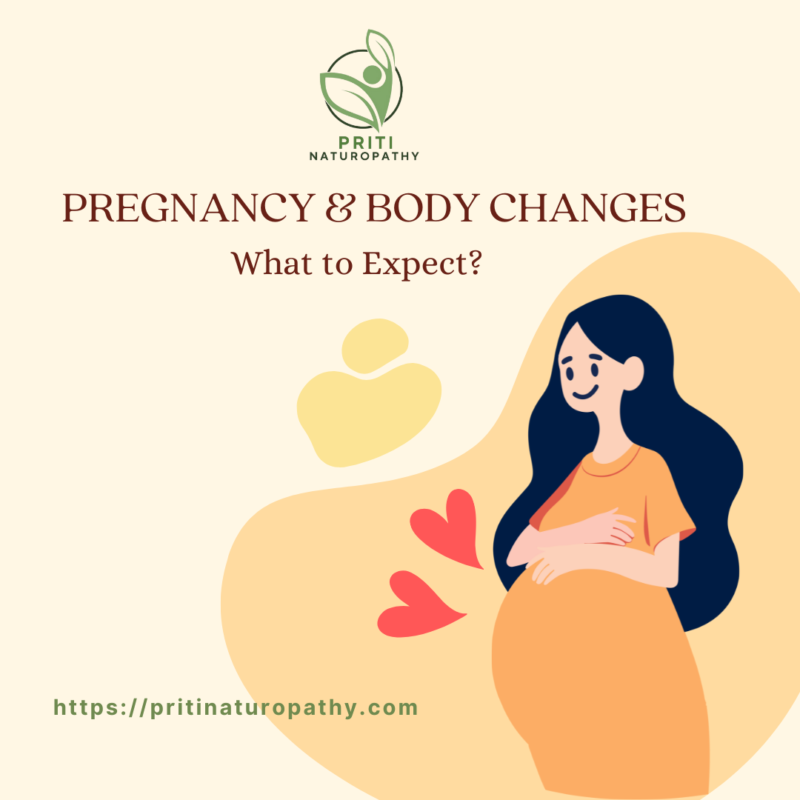Introduction
Pregnancy is a period of about 9 months. It is the period when the foetus i.e. the unborn baby grows inside the woman’s body. From hormonal changes to weight gain, every transformation serves a purpose. Understanding these changes can help mothers to prepare for a healthy and comfortable pregnancy.
Body Changes During Pregnancy
There are some physiological changes occurs during pregnancy, let’s check them.
Changes in Body Organs
The uterus and its supporting muscles increase in size to accommodate the growing foetus. This rapid growth may cause mild abdominal stretching or discomfort, which is normal. The breast grows in size and prepares to produce milk, many women experience tenderness.
(Tip: Try to wear comfortable, supportive maternity bra can reduce discomfort.)
Changes in Body Metabolism
The basal metabolic rate (BMR) increases during pregnancy, this is because body actively support the rapid fetal growth. Due to this rapid growth and development the basal metabolism increases.
Changes in the Body Fluids
There is a gradual increase in the total fluid (extracellular and intracellular fluid) content of the body. Blood. Blood volume increases by up to 50% to transport essential nutrients to the baby. However, due to the increase in blood volume, the concentration of haemoglobin (Hb) and other constituents of blood reduces.
The normal Hb level of 12 mg/100 ml of blood as seen in a healthy adult woman drops to about 10-11 mg/100 ml during pregnancy. This is a normal physiological change. A care should be taken that the Hb levels do not fall below this point.
- Normal Hb Level: 12 mg/100 ml in healthy women.
- During Pregnancy: Drops to 10-11 mg/100 ml (physiologically normal).
(Hb levels below 10 mg/100 ml require attention to prevent complications.)
(Tip: Consume iron-rich foods like spinach, lentils, dates, and pomegranate to maintain healthy hemoglobin levels.)
Changes in Digestive Functions
One important adaptation of the body during pregnancy, is the increased rate of absorption of certain important nutrients like calcium and iron. Along with the increased absorption, the following changes in the digestive functioning are also observed:
There is less production and secretion of acid and other digestive juices by the stomach. It tends to stay in the stomach for a longer time and that gives a feeling of heaviness or fullness.
The capacity of the stomach and the speed of digestion tend to decrease as the growing fetus exerts pressure on the stomach. The food, as well as, the stomach acid, tends to be pushed up into the food pipe which leads to nausea, vomiting, heartburn and, other such symptoms for indigestion in early pregnancy.
The movement of food in the digestive tract becomes slow and sluggish, this becomes more pronounced at the end of the pregnancy period, as a result, constipation commonly occurs.
Tips:
- Eat fiber-rich foods (fruits, veggies, whole grains.
- Stay hydrated (2.5-3 litres of water daily)
Changes in the Body Weight
During pregnancy a woman gains weight, it is an essential for a healthy pregnancy. The recommended gain is 10-12 kg throughout pregnancy.
- 1st Trimester (0-3 months): Minimal weight gain (fetus is still small).
- 2nd Trimester (3-6 months): Major weight gain due to fetal & maternal tissue growth.
- 3rd Trimester (6-9 months): Continued weight gain for final fetal development.
The gain in weight is due to the:
- Growing fetus
- Increase in the size of the uterus
- Development of the placenta
- Increase in breast size
- Increase in blood and total body fluids, and
- Deposition of fat in the body (which would be needed to supply energy at the time of breastfeeding the baby).
There is a progressive gain in weight during these three trimesters. It is, however, observed that the maximum weight gain occurs only during the second and third trimester.
Progressive gain in weight indicates that the fetus and the mother’s tissues are growing normally. Excess weight gain is also not advisable as this too adversely affects the health of the fetus and the woman.
(Tip: Follow a well-balanced, nutrient-rich diet for optimal weight gain.)
Final Thoughts
Pregnancy is a beautiful journey filled with physical and metabolic transformations. Understanding these changes can help expectant mothers stay healthy, reduce discomfort, and prepare for childbirth. By following a balanced diet, staying hydrated, and practicing prenatal yoga, women can navigate pregnancy smoothly.


Leave a Reply